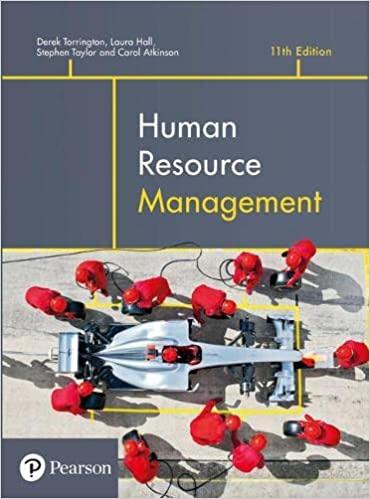The following is an opinion piece by the business writer Bernard Marr. In it the author puts
Question:
The following is an opinion piece by the business writer Bernard Marr. In it the author puts a case against typical HRM departments. Why we no longer need HR departments The time has come for HR (Human Resources) departments to call it a day. HR departments often portray themselves as a valued business partner for management and staff alike. However, how can anyone take a department seriously that refers to people as ‘resources’?
Nothing matters more to companies than the people who work there. Companies are nothing without the right people! And I am sure that not one, single individual wants to be referred to as a ‘human resource’.
So, the first point I want to make is that the name is wrong: very wrong. It signals to everyone that this department manages ‘human resources’ in a top-down fashion, i.e. managing humans in a similar way to other resources such as finance, property or machines. If departments can’t see that this is sending out the wrong messages, then they don’t deserve to be there anyway. Another issue is that HR departments are trying to serve two masters – which, in most cases, is not very successful. On the one hand, they are there to provide support for the employees and, on the other hand, they are there for the company and the senior management to help manage (and monitor, discipline, appraise, etc.) employees. This conflict of interest can cause friction and in many instances HR departments swing to the ‘support the company’ side, rather than the ‘support the employees’ side.
There is more. We can argue about whether the name is right or wrong, or whether the focus should be on the company or on the employees, but what really matters is whether HR delivers value. I have recently seen a number of companies that shut their HR departments down completely; outsourced the function or reduced it to a minimum. The reason they have done it, and not suffered any significant throw-back, is because HR wasn’t delivering any real value. Most of their time was taken up with bureaucratic and administrative tasks or legal issues. If HR doesn’t deliver some unique benefits then outsourcing it makes a lot of business sense.
Other companies, however, have invested in the ‘people function’. They realise that they need people who ensure that the company finds, recruits, retains and develops its people. So here is what I recommend:
1 Don’t call it HR!
2 Put two teams in place: a ‘people analytics’ team and a ‘people support’ team.
3 The role of the people support team is, as the title suggests, supporting all employees in the organization – from the front line to the senior leadership team. The tasks of this team include: helping employees with their development; ensuring staff engagement; identifying issues with morale and culture and generally looking after the well-being of the people in the business.
4 The role of the people analytics team is to look at people more scientifically and support the company with insights and analytics. The kind of questions this team would help to answer includes: What are our talent gaps? What makes a good employee in our company and how do we best recruit them? Which employees have got the highest potential? How can we predict staff turnover? Etc.
5 Outsource or automate the non-value adding part of HR.
Questions
1. What is the essence of Bernard Marr’s case against HR departments and common HR practices?
2. Many of the criticisms of HRM expressed in this article are commonly held by managers in organisations. Why do you think this?
3. What arguments could be deployed to counteract the major points Mr Marr makes?
4. What is your view of the alternative approach that is set out in the second part of the article?
Step by Step Answer:

Human Resource Management
ISBN: 9781292261645
11th Edition
Authors: Derek Torrington, Laura Hall, Stephen Taylor, Carol Atkinson





